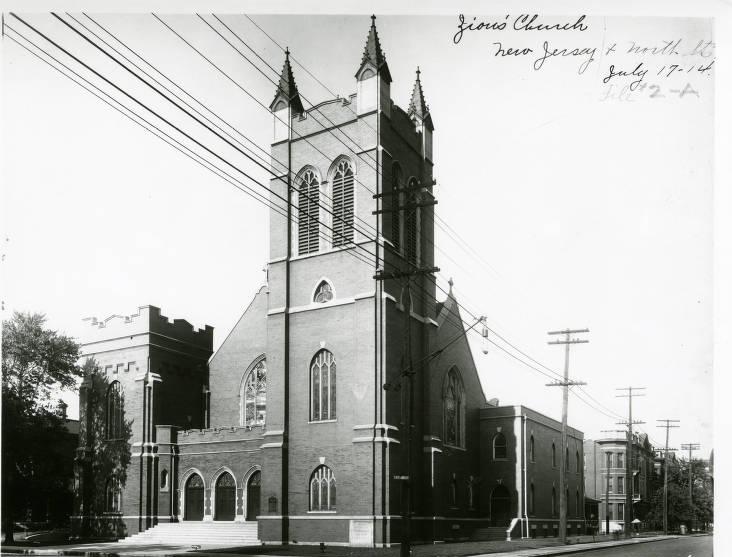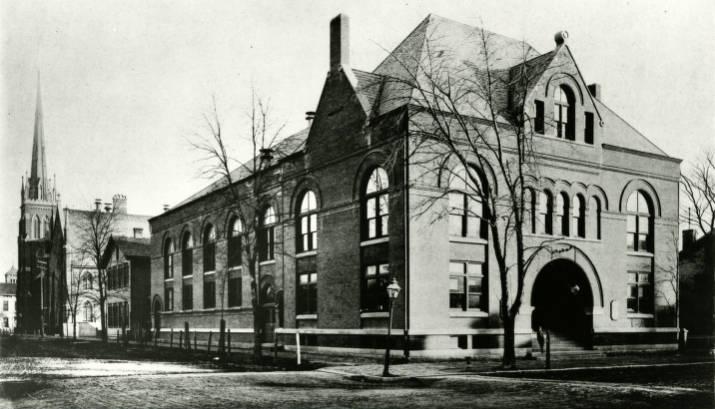The United Church of Christ (commonly abbreviated as “UCC”) formed in 1957 as a result of the uniting of four groups with deep roots: the Congregational Church, the Christian Church, the Reformed Church, and the German Evangelical Church. The merging of these Protestant denominations began in 1926 with talks between the National Council of Congregational Churches (NCCC) and the General Convention of the Christian Church or the Christian Connection. In the 1940s, during World War II, the Congregational Christian Church and the Evangelical and Reformed Church began discussions that resulted in the organization of the United Church of Christ in 1957.

Congregationalism, though energetic in sending missionaries from New England to the Indiana frontier, did not garner a large following here. The first Indianapolis church, Plymouth, was organized in 1857 and quickly became the center of the denomination in Indiana. The Christian Church, on the other hand, had its origins in more southern “primitivist” movements and therefore exerted a greater influence through immigration to the city. In 1931, these two bodies merged as the Congregational Christian Church. The sole surviving Congregationalist church affiliated with the UCC in Indianapolis is First Congregationalist UCC, which was formed by the 1908 merger of Plymouth with a smaller congregation.
Three years later, in 1934, a union took place in Cleveland, Ohio, between the Evangelical Synod and the Reformed Church, thus the Evangelical and Reformed Church. The Reformed Church’s strength lay in Ohio and Pennsylvania, yet Indiana in 1906 could boast of having the fourth-largest number of Reformed churches in the nation. The First Reformed Church in Indianapolis was founded at Ohio and Noble streets in 1852. The Evangelical Synod of North America, formed in 1872, had a background in the German pietistic tradition, particularly northern German Protestant established churches. Strong in southwestern Indiana, it had two churches in Indianapolis by 1866, including Zion Evangelical. Zion, founded in 1841, is considered the “mother” church of the denomination.
UCC congregations in Indianapolis are members of the Southeast Association of the Indiana-Kentucky Conference (IKC). The IKC was established in 1963 for the purpose of aiding local churches in their congregational and social ministries. In that year, Indianapolis hosted the first annual conference of the newly formed IKC and became its headquarters. The IKC offices are located at the .
The coming together of the four denominations did more than simply link churches administratively. While it highlighted the ecumenical conviction of the bodies, the merger also integrated histories that emphasized pietism, progressive theology, and social consciousness. , minister of from 1877 until his death in 1891, proved to be a vocal and nationally known advocate of social justice and labor rights. He was responsible for the organization of the , which from offices in Plymouth Church coordinated poor relief efforts throughout the city. The concern for the aged, the ill, and orphans was evident in the Evangelicals’ founding of Deaconess Hospital in 1895 at South and Delaware streets. The General Protestant Orphans’ Home, another Evangelical establishment, came into being in 1867. It is now , which disaffiliated in 2001. Members from Zion Evangelical, concerned about the elderly of their congregation, organized the Community in 1909. The Altenheim, now located at 3525 East Hanna Street, offers independent living, assisted living, and health care, but is no longer affiliated with the UCC.

The churches of the UCC support many social welfare organizations financially and with volunteers. Centers for the homeless, food banks, health organizations, and youth ministries are beneficiaries of the UCC’s generosity, as are national organizations such as Habitat for Humanity. Churches host senior citizens groups, the Red Cross, Parents without Partners, scouts, and preschools. The UCC has long supported campus ministries. Dr. Wayne C. Olson, a UCC minister, served as Campus Ministries director in Indianapolis and initiated campus and church programs on AIDS. He also formed the Indiana AIDS Pastoral Care Network. This legacy of broad philanthropic initiatives and siding with the oppressed has helped define the character of the modern UCC. The UCC has long ordained women to pastoral roles, a practice deeply rooted in the Congregationalist tenet of the ministry of all believers. The UCC in Indianapolis is also openly affirming of members of the LGBTQ community.
Despite nearly four decades of organic unity, the constituent members still maintain close ties to their respective heritages. This is particularly true in the older Evangelical and Reform traditions where Lutheran observances can be detected in services and in church architecture. Zion Evangelical Church’s custom of holding two services in German annually is an example of the retentive strength of ethnic traditions. The IKC-UCC maintains a partnership with the Evangelical Church of Westphalia, a Protestant denomination in Germany that serves as a tangible tie to the ethnic heritage of UCC members in the city.
As with many mainline Protestant denominations, the UCC faces an aging congregation and a loss of membership. In 1994, there were 14 congregations throughout Indianapolis proper. In 2022, only nine remain. All but one has roots.
This uniquely structured denomination therefore has managed to maintain some of the old cultural and theological diversity while it works in harmony to help fill the needs of people in modern Indianapolis.

Help improve this entry
Contribute information, offer corrections, suggest images.
You can also recommend new entries related to this topic.